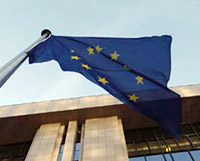Yesterday the European Parliament Resolution on the Southern Caucasus created a real panic in the governmental elite of Armenia. The legislative body of European Union claims that Karabakh is to be allocated an interim status, and the Armenian military forces are to withdraw from the “occupied areas of Azerbaijan.” It is additional to mention the negative effects of such a high-level resolution on Armenia and the NKR conflict resolution specifically. It starts from the point that the EU hence brings up a mandate to be in charge of the resolution of the issue. Secondly it expresses the joint opinion of the EU regarding the resolution and expected outcome from the NKR conflict. In other words, the RA government has real reasons to panic. However, how do they react on that resolution? Yesterday the foreign affairs minister of Armenia Edward Nalbandyan “reprimanded” the authors of this resolution by giving them advice and by exposing the contradictions of the standpoint of the EU. After Nalbandyan’s statement yesterday the whole governmental elite tried to “rip the mask” of the author of the resolution, a European Parliament MP from Bulgaria Evgeni Kirilov. Almost all the governmental MPs stated that he is a politician, who has been bought by the oil dollars of Azerbaijan. Perhaps this kind of activity is justified by advocacy purposes. But in fact it is not quite serious to connect the activity of the whole European structure with a single lawmaker or a lobbying group. In what appears to be a message primarily addressed to Azerbaijan, the resolution also says the EU legislature “condemns the idea of a military solution” to the dispute. It further stresses that “the Armenia-Turkey rapprochement and the OSCE Minsk Group negotiations are separate processes that should move forward along their own rationales.” Perhaps it is the time that besides advocacy initiatives the RA government starts to think what the consequences of such a behavior of the European structure is. They need to figure out what the result of the adoption of such resolutions is. Moreover, the same structures, including the European Parliament urge the RA government to release the political prisoners and punish the culprits of the March 1 events. The government, however, stubbornly opposes to do so by enabling these structures to adopt resolutions unfavorable for Armenia. Therefore, if the patriots of the government elite really wish to preclude the adoption of the resolutions they shouldn’t only limit themselves by criticizing the corrupt Bulgarians. But as we know self-criticism is not characteristic to our government.

